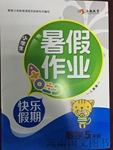题目内容
Must I wash the clothes this afternoon? No, you ________
- A.mustn't
- B.can't
- C.needn't
- D.don't

 永乾教育寒假作业快乐假期延边人民出版社系列答案
永乾教育寒假作业快乐假期延边人民出版社系列答案When I was seven years old, my family made me an ant farm. First, we put clean sand in a thin glass box. Then we waited for the ants to arrive.
After the ants were in the glass farm, they started to make tunnels(地道). I was amazed that each one knew exactly what to do. Each had its own job.
On the fifth day a tragedy(悲剧)happened. I put my face so close to the glass farm that I knocked it over. All the tunnels fell down. Although the ants remained alive after their earthquake, one by one they began to die. I was scared as I watched them give up building their tunnels to carry the bodies to a corner of the farm.
My mother said that the ants were dying of sadness. They simply could not stand that their tunnels were gone.
Although much time has passed, I still think of that ant farm. Mom had hoped it would teach me about the natural world, but it taught me much more.
Over the years, I came to realize the importance of teamwork. Working together, the ants were able to make an amazing world for themselves. I also learned that they should be admired(钦佩)for their hard work.
But there was an even larger lesson that I did not realize until recently: Adversity(逆境)is a natural part of life, and must be accepted. Unlike the ants, we cannot give up when we are sad. We have to realize that if a tunnel is gone, we must build another.
Giving up, I say, is not a good choice.
1. What did the writer’s family do for him when he was seven?
|
A.They built a farm of ants. |
B.They bought a few ants. |
|
C.They caught a lot of ants. |
D.They found an ant city. |
2.Which statement is WRONG according to the passage?
|
A.The writer knocked the glass box over because he put his face so close to the glass farm. |
|
B.The ants didn’t die one by one after the tunnels were destroyed. |
|
C.Like people, teamwork is very important for the ants. |
|
D.Giving up isn’t a good way when we meet trouble. |
3.Among the following events, which one happened first?
|
A.All the tunnels fell down. |
B.The ants died one by one. |
|
C.The ants got into the glass box. |
D.The ants began making tunnels. |
4.What did the writer learn from the ant tragedy a few years later?
|
A.Working together is useless. |
B.Teamwork is important. |
|
C.He can’t accept adversity. |
D.Working alone is amazing. |
5.What is the best title for the passage?
|
A.Ants Fear Adversity |
B.My Family and Ants |
|
C.Giving Up in Adversity |
D.Don’t give up anytime |